- Home
- Alan Bennett
The History Boys Page 7
The History Boys Read online
Page 7
Un-kissed. Un-rejoicing. Un-confessed. Un-embraced.
It’s a turn of phrase he has bequeathed to Larkin, who liked Hardy, apparently.
He does the same.
Un-spent. Un-fingermarked.
And with both of them it brings a sense of not sharing, of being out of it.
Whether because of diffidence or shyness, but a holding back. Not being in the swim. Can you see that?
Posner Yes, sir. I felt that a bit.
Hector The best moments in reading are when you come across something – a thought, a feeling, a way of looking at things – which you had thought special and particular to you. Now here it is, set down by someone else, a person you have never met, someone even who is long dead. And it is as if a hand has come out and taken yours.
He puts out his hand, and it seems for a moment as if Posner will take it, or even that Hector may put it on Posner’s knee. But the moment passes.
Shall we just have the last verse again and I’ll let you go.
Posner does the last verse again.
Dakin comes in.
And now, having thrown in Drummer Hodge, as found, here reporting for duty, helmet in hand, is young Lieutenant Dakin.
Dakin I’m sorry, sir.
Hector No, no. You were more gainfully employed, I’m sure.
Why the helmet?
Dakin My turn on the bike.
It’s Wednesday, sir.
Hector Is it? So it is.
But no. Not today.
No. Today I go a different way.
‘The words of Mercury are harsh after the songs of Apollo. You that way, we this way.’
Hector goes briskly off, leaving Dakin and Posner wondering.
Act Two
Irwin is about five years older and in a wheelchair; he is talking to camera.
Irwin If you want to learn about Stalin study Henry VIII.
If you want to learn about Mrs Thatcher study Henry VIII.
If you want to know about Hollywood study Henry VIII.
Music and video sequence.
This is Rievaulx Abbey and this vertiginous trench is its main latrine.
It is a sad fact that whatever the sublimity and splendour of the ruins of our great abbeys to the droves of often apathetic visitors the monastic life only comes alive when contemplating its toilet arrangements. (He coughs and stops.)
The Director comes on in outdoor gear, so that it’s plain this is being filmed.
Director Are you okay?
Irwin Fine.
Director Sounding a tad schoolmasterly. Touch of the Mr Quelches. Smile-in-the-voice time, you know?
Irwin Yes?
Director Pick it up from ‘the monastic life’.
Irwin The monastic life only comes alive when contemplating its toilet arrangements.
Not monks stumbling down the night stairs at three in the morning to sing the first office of the day; not the sound of prayer and praise unceasing sent heavenwards from altar and cell; no, what fires the popular imagination is stuff from the reredorter plopping twenty feet into the drains.
God is dead. Shit lives.
Wanting toilet paper, or paper of any description, the monks used to wipe their bottoms on scraps of fabric … linen, muslin, patches of tapestry even, which presumably they would rinse and rinse again before eventually discarding them. Some of these rags survive, excavated from the drains into which they were dropped five hundred years ago and more, and here now find themselves exhibited in the abbey museum.
The patron saint here, whose bones were buried at Rievaulx, was Aelred. And it is conceivable that one of these ancient arsewipes was actually used by the saint. Which at that time would have made it a relic, something at which credulous pilgrims would come to gaze.
But what are these modern-day pilgrims gazing at but these same ancient rags, hallowed not by saintly usage, it’s true, but by time … and time alone? They are old and they have survived. And there is an increment even in excrement, so sanitised by the years and sanctified, too, they have become relics in their own right … and more pilgrims come now to see them and these other remains than ever came in the age of faith.
We are differently credulous and our cults are not the same but saner, wiser, more rationa l…
(He stumbles again.) I think not.
Sorry.
Director Not like you.
You’re sure you’re okay?
Irwin Fine.
Director Let’s take five.
Irwin wheels himself back to someone who has been watching.
Irwin Familiar?
Man Some of it.
Irwin Meretricious, of course, but that’s nothing new.
Man I’ve forgotten what meretricious means.
Irwin Eye-catching, showy; false.
Man But you were a good teacher.
Irwin The meretricious often are … on television particularly.
The wheelchair helps, of course.
Disability brings with it an assumption of sincerity.
Pause.
I hope they’re paying you well.
Whose idea was it?
Man I have a counsellor. She thought it would help.
Irwin What happened at Oxford?
Man Cambridge.
It didn’t work out.
Irwin I think I heard that.
Man All the effort went into getting there and then I had nothing left. I thought I’d got somewhere, then I found I had to go on.
Pause.
About the money, my counsellor said that if I was paid for it, that would be theraputic.
Irwin I’m surprised anyone’s interested.
It’s not much of a story.
Man You’re a celebrity. It doesn’t have to be.
Irwin And did you write it yourself?
Man Yes. Well, I talked to someone from the paper.
You come out of it very well.
Irwin And Hector?
The Man says nothing.
Man I didn’t say anything about you and Dakin.
Irwin Nothing happened between me and Dakin.
Man I think it did.
Irwin No. It’s not true.
Man You used to say that wasn’t important.
Pause.
You liked him.
Irwin says nothing.
I wondered if you wanted to talk about it.
Irwin Why? Nothing happened.
Man He liked you … didn’t he?
Tell me, sir. I need to know.
Irwin Why? Why?
Pause.
Are you miked?
Man says nothing.
You’re miked, aren’t you?
Jesus.
How did you come to this?
Man They won’t print it unless you say something.
Irwin Good.
Man It’s a chance to tell your side of the story.
Irwin There is no story.
Man You don’t want to seem like Hector.
Irwin I wasn’t like Hector.
Now fuck off.
I must return to the world of Henry VIII. It suddenly seems almost cosy.
He is wheeling himself away.
Director Ready?
Man Sir.
Would you sign your book?
He has a book written by Irwin open.
Irwin shakes his head but takes the book.
Irwin Whom shall I put it to?
Man Me. David.
Irwin I never called you David. I called you Posner.
I’ll put ‘To Posner’, if that doesn’t seem unfriendly.
Which it is.
Posner (appealing) Sir.
The make-up assistant hustles Posner away. Irwin shakes his head again and goes back into the light.
Irwin Okay.
Director I’ll cue you.
Irwin’s Voice We are differently credulous and our cults are not the same … but saner, wiser, more rational … I think not.
Irwin Ours is an easier f
aith. Where they reverenced sanctity we reverence celebrity; they venerated strenuous piety; we venerate supine antiquity. In our catechism old is good, older is better, ancient is best with a bonus on archaeology because it’s the closest history comes to shopping.
Whatever we tell ourselves, things matter to us more than people. Not the scattering of communities or the torments of the martyrs or the putting of an end to prayer, no, what shocks us today about the Dissolution is the loss of things. Which, since monasticism originated in a flight from things, is something of an irony. So that you could say that it was at the moment of the Dissolution that the monasteries came closest to the ideals of their foundation and that it was thanks to the villain Henry VIII that the monasteries achieved their purpose and their apotheosis.
A silence.
Director Lovely. Though we’re still not sure about apotheosis.
Irwin It is BBC2.
Classroom.
Hector is in sombre and distracted mood.
Posner (young) ‘Apotheosis: a perfect example of its type. Moment of highest fulfilment.’
Hector is miles away.
Sir. Apotheosis. Moment of highest fulfilment.
Hector Oh yes. Very good, dictionary person.
Now. Can I have your attention. I … I have something I have to … tell you.
Pause.
Akthar We know, sir.
Hector Oh.
Dakin About sharing lessons with Mr Irwin, sir?
Hector Ah.
Lockwood Why is that, sir?
Hector That?
Oh. It’s just a question of timetable, apparently.
No. What I was going to tell you …
Lockwood What’s the point, sir?
Your lessons are so different from his.
The whole ethos is different, sir.
Timms And we relish the contrast, sir.
Crowther Revel in it, sir.
Lockwood Yin and yang, sir.
Akthar The rapier cut and thrust, sir.
Timms It’s all about variety, sir.
Hector Hush, boys. Hush. Sometimes … sometimes you defeat me.
Dakin Oh no, sir. If we wanted to defeat you we would be like Cordelia and say nothing.
Hector Can’t you see I’m not in the mood?
Dakin What mood is that, sir? The subjunctive? The mood of possibility? The mood of might-have-been?
Hector Get on with some work. Read.
Lockwood Read, sir? Oh come on, sir. That’s no fun.
Akthar Boring.
Hector Am I fun? Is that what I am?
Timms Not today, sir. No fun at all.
Hector Is that what you think these lessons are? Fun?
Lockwood But fun is good, sir.
You always say …
Posner Not just fun, sir.
Akthar (pointing at Posner) Would you like him to sing to you, sir? Would that help?
Hector Shut up! Just shut up. All of you.
SHUT UP, you mindless fools.
What made me piss my life away in this god-forsaken place? There’s nothing of me left. Go away. Class dismissed. Go.
He puts his head down on the desk.
There are some giggles and face-pullings before they realise it’s serious.
Now they’re nonplussed and embarrassed.
Scripps indicates to Dakin that Hector is crying.
Scripps is nearest to him and ought to touch him, but doesn’t, nor does Dakin.
Posner is the one who comes and after some hesitation pats Hector rather awkwardly on the back, saying, ‘Sir.’
Then he starts, still very awkwardly, to rub his back.
Scripps I was the nearest. I ought to have been the one to reach out and touch him. But I just watched.
Dakin did nothing either. Neither of us did.
He looks at Dakin, who looks away.
Later I wrote it all down.
Hector sits up and blows his nose loudly.
Hector I don’t know what all that was about, I’m sure.
Nothing is here for tears, nothing to wail.
I am an old man in a dry season. Enough.
The boys are still a bit abashed.
Timms These two have got something to cheer you up, sir.
Dakin Oh yes. A film, sir.
Hector Oh, a film. Goody goody. And twenty-three pounds in the kitty!
Dakin (indicating Scripps) He’s the woman, sir.
Hector Off you go.
Francesca (Scripps) is playing Beethoven’s ‘Pathétique’ Sonata on the piano. James Mason (Dakin), her guardian, limps to the piano.
Dakin Francesca. You belong to me. We must always be together. You know that, don’t you? Promise you’ll stay with me always. Promise.
She slowly shakes her head.
Very well. If that’s the way you want it. If you won’t play for me, you shan’t play for anybody ever again.
He brings his stick down across her fingers on the keyboard. She shrieks and rushes sobbing from the room.
Hector If I say Greig’s Piano Concerto?
Dakin/Scripps No, sir.
Hector If I say Svengali?
Dakin/Scripps (beginning to congratulate themselves) No, sir. No.
Hector And if I say 1945, James Mason and Anne Todd in The Seventh Veil?
Dakin/Scripps Aww, sir!
The other boys are delighted at their failure.
Hector Pay up, pay up and play the game!
The bell goes. Hector is left, after they’ve all cleared,
sitting at the table.
Headmaster Did he say why he was going?
Mrs Lintott More or less.
Headmaster I am surprised. I have said nothing to anyone.
As I left it he was considering his position.
I hope he will go.
Mrs Lintott He would like to stay. To work out his time.
That’s what I wanted to ask.
Headmaster Shall I tell you what is wrong with Hector as a teacher?
It isn’t that he doesn’t produce results. He does. But they are unpredictable and unquantifiable and in the current educational climate that is no use. He may well be doing his job, but there is no method that I know of that enables me to assess the job that he is doing.
There is inspiration, certainly, but how do I quantify that? And he has no notion of boundaries. A few weeks ago I caught him teaching French. French!
English is his subject. And I happened to hear one child singing yesterday morning, and on enquiry I find his pupils know all the words of ‘When I’m Cleaning Windows’. George Formby. And Gracie Fields. Dorothy, what has Gracie Fields got to do with anything?
So the upshot is I am glad he handled his pupils’ balls because that at least I can categorise.
It is a reason for him going no one can dispute.
And I was so pleased on the night Mrs Armstrong told me she was startled to find she was the object of unaccustomed sexual interference herself. That is a measure of how pleased I was, though I shan’t say that to the inspectors.
Mrs Lintott says nothing.
You didn’t know. He hadn’t told you why he was going?
Mrs Lintott Not that, no.
Headmaster I assumed you knew.
Mrs Lintott No.
Headmaster In which case you must keep it to yourself, both his going and the reason for it.
Mrs Lintott He handled the boys’ balls?
Headmaster I don’t want to spell it out. You’ve been married yourself, you know the form. And while on the motorbike. He, as it were, cradled them. To be fair it was I think more appreciative than investigatory but it is inexcusable nevertheless. Think of the gulf of years. And the speed! One knows that road well.
No, no. It’s to everyone’s benefit that he should go as soon as possible. (He goes.)
Mrs Lintott I have not hitherto been allotted an inner voice, my role a patient and not unamused sufferance of the predilections and preoccupations of men. They kick
their particular stone along the street and I watch.
I am, it is true, confided in by all parties, my gender some sort of safeguard against the onward transmission of information … though that I should be assumed to be so discreet is in itself condescending. I’m what men would call a safe pair of hands.
Irwin comes in.
Our Headmaster is a twat. An impermissible word nowadays but the only one suited to my purpose. A twat. And to go further down the same proscribed path, a condescending cunt.
Do you think Hector is a good teacher?
Irwin Yes, I suppose … but what do I know?
Mrs Lintott You see, I probably don’t. When I was teaching in London in the seventies there was a consoling myth that not very bright children could always become artists. Droves of the half-educated left school with the notion that art or some form of self-realisation was a viable option. It’s by the same well-meaning token that it’s assumed still that every third person in prison is a potential Van Gogh. And love him though I do I feel there’s a touch of that to Hector … or what’s all this learning by heart for, except as some sort of insurance against the boys’ ultimate failure?
Not that it matters now, one way or another.
Irwin Why? What’s happened?
Mrs Lintott Nothing. Nothing. (She is going.) Isn’t this his lesson?
Irwin It is. But we’re sharing, hadn’t you heard?
Mrs Lintott Sharing? Whose cockeyed idea was that?
Don’t tell me.
Twat, twat, twat.
Boys come in, followed by Hector. They sit glumly at their desks.
Irwin Would you like to start?
Hector I don’t mind.
Irwin How do you normally start? It is your lesson.
General Studies.
Hector The boys decide. Ask them.
Irwin Anybody?
The boys don’t respond.
Hector Come along, boys. Don’t sulk.
Dakin We don’t know who we are, sir. Your class or Mr Irwin’s.
Irwin Does it matter?
Timms Oh yes, sir. It depends if you want us thoughtful. Or smart.
Hector He wants you civil, you rancid little turd. (Hits him.)
Timms Look, sir. You’re a witness. Hitting us, sir. He could be sacked.
Irwin Settle down. Settle down.
I thought we might talk about the Holocaust.
Hector Good gracious. Is that on the syllabus?
Irwin It has to be. The syllabus includes the Second War.
Hector I suppose it does.

 The Uncommon Reader: A Novella
The Uncommon Reader: A Novella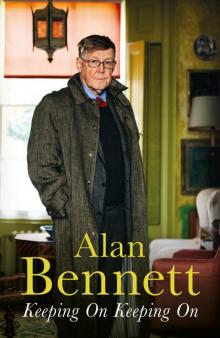 Keeping On Keeping On
Keeping On Keeping On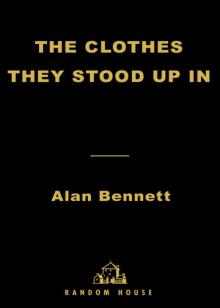 The Clothes They Stood Up In
The Clothes They Stood Up In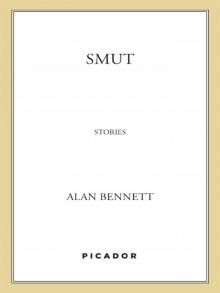 Smut: Stories
Smut: Stories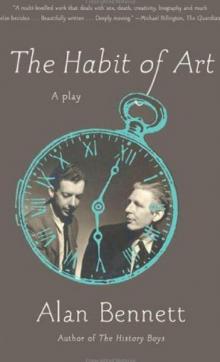 The Habit of Art: A Play
The Habit of Art: A Play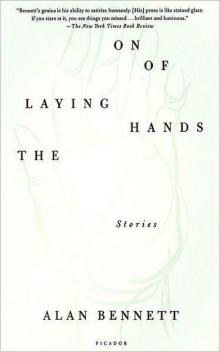 The Laying on of Hands: Stories
The Laying on of Hands: Stories The Madness of George III
The Madness of George III Writing Home
Writing Home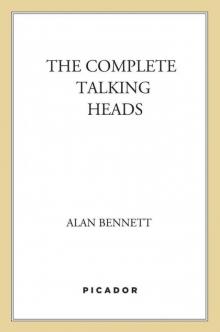 The Complete Talking Heads
The Complete Talking Heads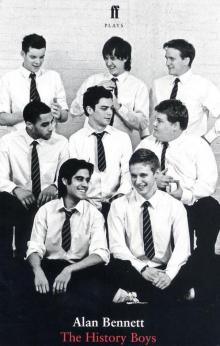 The History Boys
The History Boys Lady in the Van
Lady in the Van The Lady in the Van
The Lady in the Van Four Stories
Four Stories Alan Bennett: Plays, Volume 2
Alan Bennett: Plays, Volume 2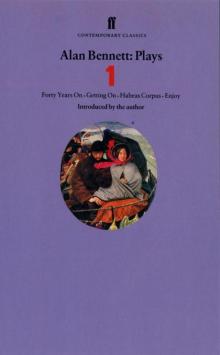 Alan Bennett: Plays, Volume 1
Alan Bennett: Plays, Volume 1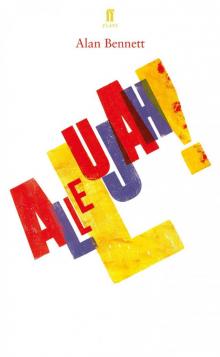 Allelujah!
Allelujah!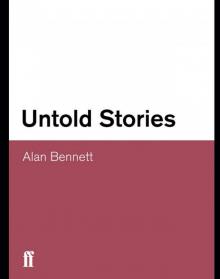 Untold Stories
Untold Stories Six Poets
Six Poets